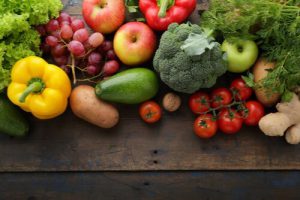The short answer is yes, the foods you eat can bolster your body’s ability to fend off UV damage by acting as a natural sunscreen. However, your diet should never be considered a substitute for sunscreen. That’s a recipe for a severe sunburn! Rather, the take-away point to remember here is that the foods you eat can benefit your skin’s health in so many amazing ways, helping to protect your skin from the sun, boost new collagen and elastin growth and even fend off aging!
When it comes to your skin, the key is consuming foods that are high in antioxidants, protective compounds that help fend off free-radical damage throughout your body. Antioxidants are well known for reducing risk of heart disease and other illnesses, and they are equally effective at protecting the skin, your body’s largest living organ, by preventing oxidative damage from the sun and reducing inflammation of your skin cells. A 2001 study found that when the antioxidant vitamin C was applied to the skin, it was able to destroy any free radicals it came into contact with. That’s just one example of why all our medical-grade skin care lines are packed with antioxidants like vitamin C. They are clinically proven skin protectors!
Now, which foods can best protect your skin? Here’s a list of Top Foods for Sun Protection from FoodRevolution.com!
1) Grapes and Grape Seed
Sixty to seventy percent of the polyphenols in grapes are in their seeds. Grapes contain a unique type of polyphenol called procyanidin, which may have cancer-preventing properties. Studies have shown the ability of grape seed proanthocyanidins to attack melanoma cells, and lab studies have shown their effectiveness in targeting oral squamous cell carcinoma. Research suggests that grapes and grape seed extracts could offer sun protection by reducing the effects of UV rays on skin.
2) Garlic and Onions
Garlic and onions are part of the Allium family of vegetables. Their oils have been shown to slow skin cancer and reduce tumors in mice. The beneficial effect of alliums on skin cancer and other diseases is largely attributed to their organosulfur compounds.
3) Pomegranate
Research shows promise for the use of pomegranate extract, oil and juice to prevent UVB-induced skin cancer. Even when mice were fed water containing pomegranate fruit extract, they experienced a reduced risk for UVB-induced skin cancer as well as lessened tumor growth.
4) Green Tea
One major polyphenol in tea is EGCG, which has been shown to protect skin against UV radiation effects. A 2007 population study found that drinking one cup (or more) of tea per day for at least one month reduced risk for basal cell carcinoma. This has also been shown in animal studies when mice were fed green tea. Green tea may have the ability to boost DNA repair, preventing non-melanoma skin cancers. Matcha green tea is especially potent.
5) Soy Beans
Soy foods are rich in compounds called isoflavones, which bind to estrogen receptors in your skin and may reduce wrinkles. They also improve skin elasticity, increase collagen synthesis, and have an overall skin protective effect. However, when consuming soy and soy products, choose organic soy to avoid harmful GMOs.
6) Mushrooms
The Chaga mushroom has been studied for its ability to suppress tumor growth in mice, and its extract has been shown to cause melanoma cell death in mice. Some research suggests that Chaga mushroom extract has promising potential in cancer treatment.
7) Turmeric
One of the oldest Ayurvedic spices, turmeric has many health benefits. Its main active ingredient is curcumin, which has been widely studied for cancer prevention. Turmeric and curcumin have been shown to significantly reduce cancerous skin lesions and inhibit cancer cell signaling. One study showed that topical and oral curcumin were equally effective at slowing skin cancer tumor growth in mice.
8) Dark Green Leafy Vegetables
A high intake of green leafy vegetables — such as kale, spinach, collard greens and swiss chard — may reduce skin cancer risk. Research suggests this protective effect has to do with their lutein and beta carotene content. A 2007 study also found that a diet high in fruits and vegetables, like dark leafy greens, reduced risk of squamous cell carcinoma — whereas a diet high in fat and meat increased risk.
9) Ginger
Ginger is effective at slowing tumor growth and killing skin cancer cells, while fresh ginger juice has been shown to treat skin burns and lesions in lab, animal and epidemiological studies. And gingerol, a chemical compound found in fresh ginger, has been shown to block the growth of skin cancer cells.
10) Milk Thistle Seed
Milk thistle compounds applied to the skin of mice exposed to UVB radiation prevents the development of skin cancer. What’s interesting about this is that protective effects were seen when the milk thistle was applied both before and after UVB exposure. This suggests that it actually blocks cancer pathways and doesn’t just act like sunscreen. Another similar study found that skin tumor growth was slowed when mice were fed silymarin, a phytochemical found in milk thistle.
It’s worth noting that protecting your skin from the sun also helps it to efficiently generate new collagen and elastin, the bedrocks of healthy, youthful-looking skin. So protecting your skin from the sun is also enhancing your skin’s beauty. And speaking of collagen, certain foods may help boost your skin’s production of collagen, including bone broth, chicken, red bell peppers, green leafy vegetables, citrus, tropical fruits, berries, tomatoes, cashews, fish, shellfish, egg whites and beans.
Interested in learning more about enhancing the health and beauty of your skin? You are in the right place! Atagi Plastic Surgery & Skin Aesthetics offers a leading range of skin revitalizing treatments and medical-grade skin care products. Call 303.327.7300 or fill out our online consultation request form today!



